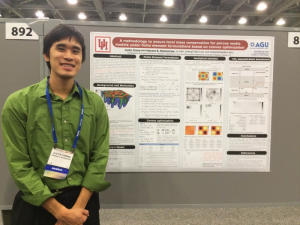Later this year, civil engineering Ph.D. student Justin Chang's educational career will receive a boost in the form of funding from the U.S. Department of Energy's Office of Science Graduate Student Research (SCGSR) Award. The SCGSR program provides supplemental awards to support part of a graduate student’s thesis research to be conducted at a DOE laboratory.
The SCGSR award term is from mid-August through next January, and the award is intended to cover incremental costs associated with living and travel expenses for Chang's proposed SCGSR research project, “Enhancing predictive capability of flow and transport in the subsurface,” to be conducted at Los Alamos National Laboratory (LANL) during the award term period. Chang's advisor is Kalyana Nakshratala, civil and environmental engineering assistant professor.
"It is a pleasure working with Justin. He is quite methodical in attacking research problems," Nakshratala said. "The award has two criteria: potential and academic preparation of the student and the merit of the research proposal. Justin has obtained a good foundation in mechanics, numerical methods, applied mathematics, and parallel computing," he said.
During the award period, Chang will use the travel stipend for living and travel costs associated with his work to the LANL in New Mexico, where he will write scientific code and study the computational efficiency of these numerical methods on state-of-the-art high performance computing (HPC) systems.
"When I first heard about my acceptance, I was thrilled. Working alongside world-class researchers at Department of Energy national laboratories is such a rare opportunity," Chang said. "All of the research I conduct in those five months will go directly into my doctoral dissertation. It is my hope that the hands-on experience and scientific skills acquired will help our Computational and Applied Mechanics Laboratory (CAML) research group as well as the civil engineering department become significant contributors to the computational Earth and environmental science and HPC communities."
